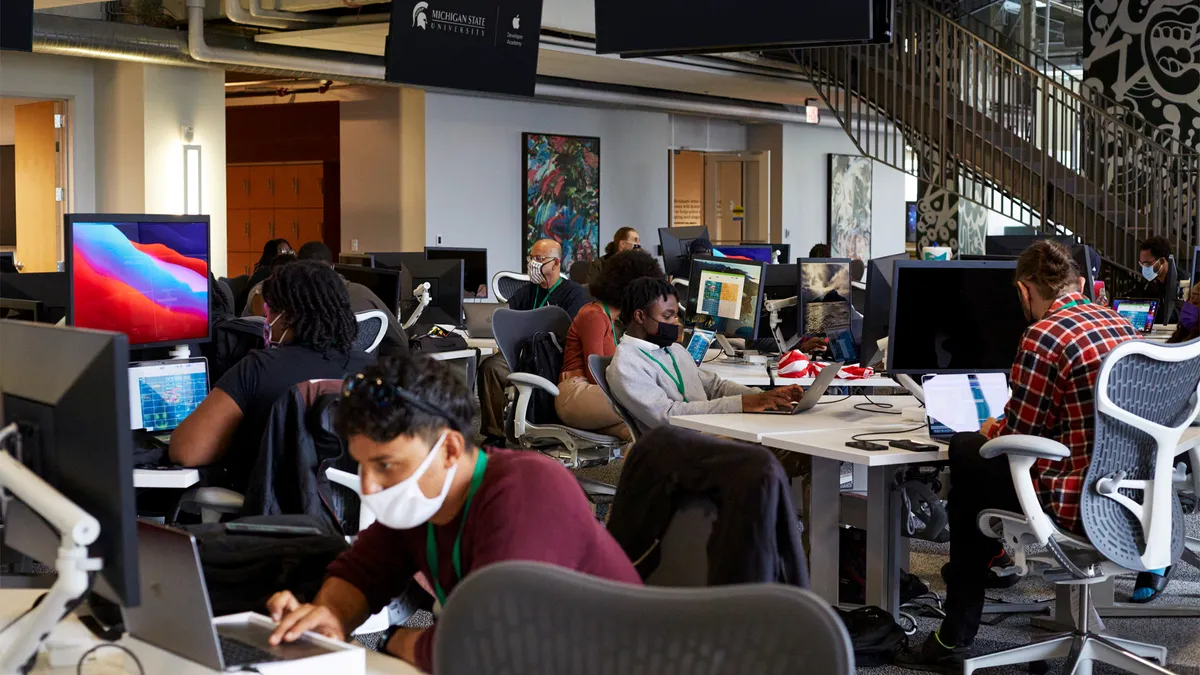When it comes to creating a competitive organization, employers need to hire good people and develop their talents through ongoing training.
If this is the case, then why don't employees have enough support when it comes to their career growth?
Studies show employees don't feel like their boss cares
A Robert Half Finance and Accounting study indicated that half of all employers in the finance industry do not allow employees to participate in professional development while on the company clock — in a field that demands ongoing updates.
A new poll conducted by Monster indicates that an overwhelming 72% of employees do not feel like their manager or supervisor cares about their career potential. It’s no wonder why so many employees are disengaged and disconnected from their companies: they don't feel invested in.
Who is responsible for employee career growth?
Perhaps all of this comes down to old fashioned ideas about who is ultimately responsible for career development. One can argue in favor of employers or employees equally, but the impact that is felt within the organization is what truly matters.
HR Dive spoke with Monster Career Expert Vicki Salemi about the importance of managers having a positive relationship and open dialogue when it comes to employee career development. The poll of over 3,000 employees shed light on just how critical this is.
“Managers may think they are demonstrating a path for employee career development, but at the end of the day, all employees are looking for support for job growth and potential," Salemi said. “Employees need structured guidance, but unfortunately not all bosses are wired this way.”
As more companies implement informal performance review policies, managers need to be proactive in having more frequent informal conversations with employees about their career goals and the training they need. “When employees receive mentoring and help, they understand that the company has their back,” she said.
Some could argue that it’s up to employees to forge their own career success and not rely on companies to provide professional development. To this point, Salemi said: “Everyone needs to be proactive and put themselves first. Don't wait for the boss to initiate things. Go after promotions and do what it takes to get them.” Supervisors can certainly let their employees know that they expect some level of proactive engagement.
Where does employer resistance come from?
To learn more about what’s happening in professional development, HR Dive also spoke with Robert Half’s Vice President Kathleen Downs. In addition to seeing the financial world change over the span of a 17-year career, Downs has also been an adjunct professor and has a keen knowledge of professional development curriculum.
Downs has seen over and over again how companies say they want cutting-edge people to work for them, but they don't want to be part of the solution. For example, she knows of many CPA candidates who will refuse job offers if organizations do not offer support for earning the required credits to stay certified.
Why are companies reluctant to allow employees to pursue professional development while on the company clock? “It comes down to fear that if an employer spends time and money on helping an employee earn his credentials, this is just preparing them for their next employer,” Downs said. “Employers will lose these people anyway if they are not being developed or feeling supported in their career growth."
She added that training can actually become a way to retain more employees and companies should ask themselves: would they like their employees to be more productive while they are working for them, or do they want to get a reputation for not offering this benefit?
When companies get employee development right
General Electric is a great example of a company that has made it a priority to invest in the success of its workforce through a focused training initiative. The company is committed to providing all levels of employees, and even those who work remotely, with ongoing professional development training.
Lucas Miller, Product Manager, Performance Development for GE told HR Dive: “At GE, our leadership philosophy is ‘We All Rise.’ This means we believe that when one of us gets better, we all get better.”
That outlook stems from move away from annual performance reviews — a format originally pioneered by GE leadership. Their switch to a more informal, real-time feedback program made waves in the HR world as a sign of changing values industry-wide.
"As we built out this approach, we learned that employees who practice these behaviors are helping our culture transform to be faster, simpler, more adaptive, and customer-focused," Miller said. "In this sense, investing in our employees growth and development is helping us deliver on the outcomes that we want.”
Getting employees to get on board with career development
One of the biggest hurdles is, as usual, engaging employees in the process.
“All companies need to find out what employees want to learn and then develop useful curriculum around it," Downs said. "Outsource to experts and make learning a priority. But most of all, make learning fun and provide reasonable incentives to employees who complete their training.”
Managers can create dialog with employees about their career goals by providing proper guidance.
“Ask employees how to make their job more enjoyable and productive,” Salemi said. Better bosses are open to being transparent and supportive, and this takes a bit of vulnerability. But it pays off through more productive and happy employees.





















